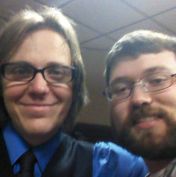If the Steep Canyon Rangers gave us a great performance at the Library of Concert last night, then Dailey & Vincent put on a good show – and that’s the key difference between the two bands. Performance vs show, an entertaining focus on music vs a musical focus on entertainment.
I don’t say that to sound dismissive. Cornpone and schtick aren’t my thing and weren’t what I was in the mood for, but that’s a pretty subjective statement. I do wish Dailey & Vincent’s show hadn’t overshadowed the music, because there was a lot of talent up there that could have spoken for itself and held its own. But if you like old-timey cornpone fun, you’ll love Dailey and Vincent. The presentation felt like a cross between the Grand Ole Opry and Hee Haw. Jamie Dailey was an obviously but well-rehearsed (and self-promotional) MC who came across as much the earnest host as he did the star. Sure enough, their very first paying gig as a duo was at the Ryman.
The band is fronted by bluegrass musicians and tenors Dailey and Darrin Vincent. The’ve got quite the credentials: Dailey was the lead singer for Doyle Lawson & Quicksilver, and Vincent was part of Ricky Skaggs’ Kentucky Thunder. It shows. They’re definitely good musicians – but this is a concert review, not an album review, and music just wasn’t the main focus of their show.
Their bluegrass roots always showed, yet they successfully straddled many genres. There was an electric guitar. The fiddler, BJ Cherryholmes, was very talented, and played as much in a country style as bluegrass. The Gospel influence was felt throughout the show, especially in the a capella quartets. They kicked the show off with a bombastic cover of Phillip Phillips’ “(Make this Place Your) Home” and an audience singalong of John Denver’s “Country Roads.”
The two best things I can say about Dailey & Vincent are first, the band is a worthy musical heir to the Statler Brothers. When all of them sang at once and actually put the emphasis on the music, that’s exactly who they sounded like – and they do in fact have an album of Statler Brothers covers I might well buy.
Second, I’m not sure I’ve ever heard someone sing as low AND as clear as bassist Christian Davis. That young man has an AMAZING voice! And the band knows it, showcasing his deepest notes often (even when it didn’t make sense to do so). Davis gets a lot of credit; I just wish the instruments hadn’t all but drowned out his big solo on the finale.
They were all quite talented, not just Davis. When the front duo of Dailey and Vincent performed a duet – Dailey on guitar, Vincent on mandolin, and both harmonizing as high tenors with some falsetto – it was classic bluegrass and great music.
But it was easy to loose sight of that given the fun, hoopla, and ra-ra jingoism the rest of the show was engineered to get us all caught up in. Take a look at the set they use in this video – that visual captures a lot. Of course I love America, but if every other sentence talks up freedom, praises vets, and gets in your face about red white and blue, it starts to feel forced – more like cheap, jingoistic nationalism than true country patriotism.
It wasn’t all jingoism. Some of it was schtick. Singer and mandolin player Jeff Parker is a real ham – no weight pun intended. He came across as a goofy extrovert who loved to have fun. And that’s not a bad thing, if you’re into schtick! None of this, aside from the nationalism, is objectively a bad thing; it’s just a question of personal preference. If you like cornpone – and I don’t – you’ll love Dailey and Vincent. And if you don’t but you still enjoy Gospel and/or bluegrass, you might still like their albums. There sure was a lot of musical talent up there, and I really look forward to hearing it when there isn’t an act to overshadow it.
Dailey & Vincent are Jamie Dailey, Darrin Vincent, Jeff Parker, Christian Davis, BJ Cherryholmes, and Jessie Baker on banjo, Seth Taylor on lead guitar, and Bob Mummert on drums. They are signed to Rounder Records.



 e to do that again – someone who can unite the red dirt cowboys, the Mumford hipsters and Lumineer moms, and the old singer-songwriter foagies.
e to do that again – someone who can unite the red dirt cowboys, the Mumford hipsters and Lumineer moms, and the old singer-songwriter foagies.

 ke over a genre once it starts to get popular – and the people always counter with something new. When pop became stale, along came rock. When rock became too slick, along came punk. When Nashville threw out the steel guitars, the Texas outlaws gave them the middle finger and the neo-traditionalists pulled Hank Williams’ old cowboy hat out of the dumpster. And today, with pop more obsessed with teenagers than ever, indie folk has come along with its banjos.
ke over a genre once it starts to get popular – and the people always counter with something new. When pop became stale, along came rock. When rock became too slick, along came punk. When Nashville threw out the steel guitars, the Texas outlaws gave them the middle finger and the neo-traditionalists pulled Hank Williams’ old cowboy hat out of the dumpster. And today, with pop more obsessed with teenagers than ever, indie folk has come along with its banjos.